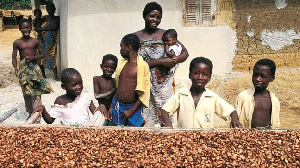- Home - News
- Polls
- Year In Review
- News Archive
- Crime & Punishment
- Politics
- Regional
- Editorial
- Health
- Ghanaians Abroad
- Tabloid
- Africa
- Religion
- Election 2020
- Coronavirus
- Photo Archives
- News Headlines
- Press Release
General News of Saturday, 17 October 2020
Source: GNA
Parliament approves US$20 million support rural livelihood
Parliament has approved US$20 million Financing Agreement between the Government of Ghana and the International Fund for Agricultural Development (IFAD) to finance the Emergency Support to Rural Livelihood and Food Systems (ESRF).
The ESRF was established as one of government’s response to the COVID-19 pandemic with a primary goal to protect the livelihood, incomes, and resilience of target groups from the impact of the COVID-19 pandemic and from climate change.
The terms of the loan are: the total amount of US$20 million made up of a Loan Facility of US$10 million and Blend of US$10 million. The interest rate on loan is zero percent while that on Blend is 1.3 percent, Service charge on Loan is 1.31 percent whereas that on Blend is 1.33 percent. The Moratorium on Loan is 10 years whilst Blend is 5 years.
The repayment period for the loan is 40 years whereas the Blend is 20years and the Grant Element of the Loan is 50.24 per cent whilst the Blend is 24.14 per cent, with a Weighted Grant Element of 37.19 percent.
Dr Mark Assibey-Yeboah, Chairman of the Finance Committee of Parliament, presenting the committee’s report, observed that the outbreak of the COVID-19 pandemic and its ravaging effect on global economies including Ghana had adversely impacted agriculture, particularly food security.
To mitigate the impact of COVID-19 and avert the possibility of a food security crisis, there is the need to strengthen Ghana’s food systems and ensure a more inclusive, resilient and productive rural economy, he said.
The Chairman announced therefore that the Government of Ghana was seeking to access emergency funding support from IFAD to finance the implementation of the ESRF.
Dr Assibey-Yeboah explained that Component One of the project “which is to protect against hunger and build resilient livelihood was allocated US$17,636,000. This is to provide 37,250 beneficiaries with timely access to inputs (seeds, fertilizers, etc) to increase production, support 5,000 vulnerable beneficiaries with direct cash transfer and rations to overcome hunger and prevent nutritional gaps.”
He said component two of programme which dealt with safeguarding rural marketing linkages and food security was allocated US$1,679,000. This would provide stimulus to the agribusinesses to develop marketing linkages with 25,000 smallholders, ensuring that these smallholders had secured income and cash availability after harvest or production.
According to the Chairman, Component 3 of the programme which dealt with Project Management, Monitoring and Evaluation, was allocated US$685,000. This would be undertaken through the Project Coordination Unit (PCU) and Zonal Coordination Unit (ZCU).
Dr Rashid Pelpuo, Member of Parliament (NDC) for Wa Central, said life should go on despite the challenges posed by COVID-19 pandemic especially with commitment to agriculture and food security.
He however expressed concern that despite the country receiving US$1billion Rapid Credit Assistance from the IMF, the House approving US$100 million from the World Bank and GHS10 billion from the Bank of Ghana and now US$20 million, the House was yet to see any accountability report on the funds.
“I Speaker, I do not know what we are doing with these monies we are amassing and I have a feeling that we are not doing the right thing. If we have taken all these monies yet we are not producing results or report as to how the money was spent,” Dr Pelpuo said.
“I think that we should not indebt this country in the name of COVID,” he added.
Entertainment










